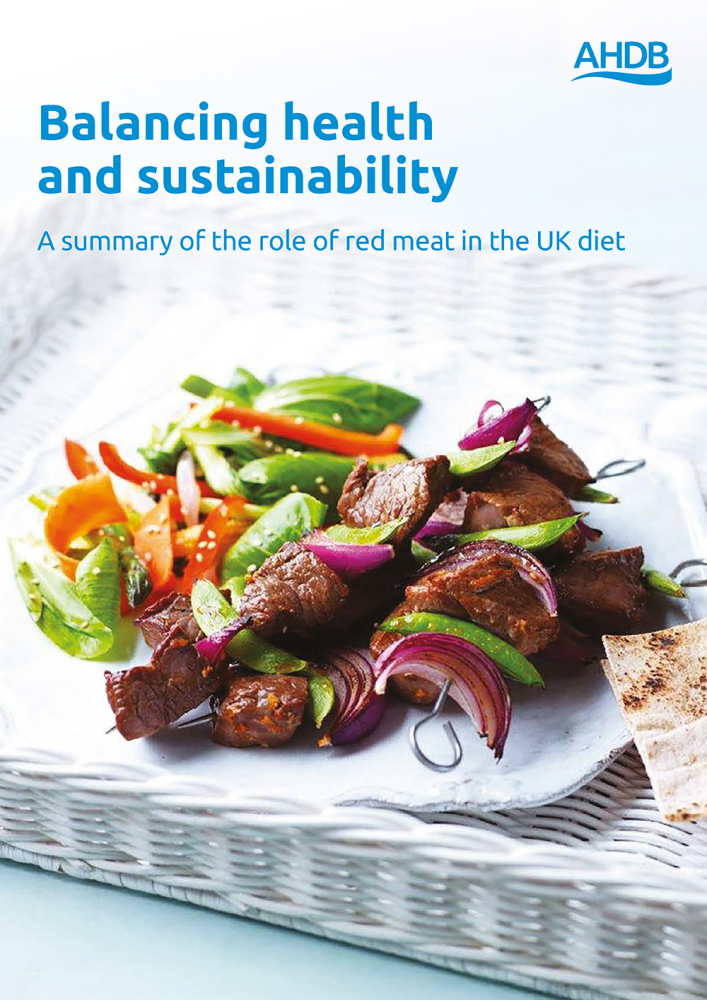- Home
- Balancing health and sustainability: the role of red meat in the UK diet
Balancing health and sustainability: the role of red meat in the UK diet
The 'Balancing health and sustainability: the role of red meat in the UK diet' report looks at how UK agriculture can contribute to improved nutrition, public health, environmental sustainability and global food security.
Co-written by independent nutritionists and AHDB experts, it looks at existing evidence to provide a balanced, evidence-based understanding of red meat’s role in supporting healthy diets and the environment – a topic that often divides opinion among experts.
Summary
The report concludes that eating less red meat is not a ‘silver bullet’ that will save the planet and improve our health, and is supported by these key findings:
- Health – A one-size-fits-all approach to meat reduction is inappropriate and tailored strategies are essential for health and sustainability
- Environment – Well-managed livestock farming systems can offer key environmental benefits for the planet, such as carbon storage, habitat management and improved soil health, which support the UK’s net zero ambitions
- Global food security – A sustainable global food system does not necessarily require less meat (and dairy) but a focus on improving the sustainability of its production
You can find out more detail about these points below.
By providing evidence-based analysis of the health and environmental impacts of red meat in the UK diet, this report will help inform the public and policymakers with clear, scientifically backed insights on both its nutritional benefits and the advances in sustainable farming practices.
Key findings in detail
Health
- Instead of adopting a one-size-fits-all less meat approach to dietary change, guidance should align with the Government's Eatwell Guide, which recommends "If you currently eat more than 90g (cooked weight) of red or processed meat a day, it is advised that you cut down to 70 g". This is around 500 g of red meat per week as part of a healthy, balanced diet
- The majority (64%) of UK adults already fall within the Eatwell guidelines so public health efforts should focus on reducing consumption among heavy meat eaters (particularly processed), typically men aged 19–39, averaging 86 g a day. For those already consuming within recommended levels, further reductions are unnecessary and could lead to nutrient deficiencies
- Lean, unprocessed red meat is among the most nutrient-dense foods available. It provides key essential nutrients such as high-quality protein, bioavailable iron, zinc, and vitamin B12, and is of particular benefit to vulnerable groups like children, teenage girls, pregnant women, and older adults. A one-size-fits-all reduction message could further impact micronutrient intakes (iron, zinc, selenium and B12) within an already nutritionally compromised population
- We must have a clearer distinction between lean unprocessed and processed red meat with consistent definitions to provide more accurate dietary and health recommendations. The health benefits of lean unprocessed red meat should not be underplayed by being grouped together with other categories, including processed red meat. This often is the case in dietary guidelines, national surveys and research studies, and can lead to inaccurate assumptions that the health risks are the same, when they are not, creating unnecessary confusion among consumers
Environment
- By enhancing sustainable farming practices – such as improving breeding, animal health and land management – we can deliver healthy and sustainable diets and meet the growing global demand for nutritious food while safeguarding global food security and the environment
- A better understanding of the environmental benefits of agriculture at a local level is required, particularly when it comes to farming’s ability to increase soil carbon stocks. This is why AHDB is leading a baselining pilot to better understand the true environmental contribution of UK farms
- The integration of livestock into the circular economy is essential for addressing food waste and enhancing resource efficiency within primary production. By repurposing inedible plant parts and surplus food into highly nutritious animal products, we can improve nutrient cycling and reduce the demand for additional feed crop
- Livestock plays a vital role in reducing waste from crop production. An estimated 1 kg of plant-based food production generates at least 3–5 kg of crop material not suitable for human consumption but is suitable as feed for animal production
Global food security
- Food security and sustainability are global issues and not only exclusive to the UK. Agriculture in the UK should be viewed in a global context, with its potential to provide the world with nutritious and sustainable red meat for the benefit of the planet and people’s health
- Livestock farming in the UK is among the most sustainable in the world. Our ability to produce sustainable, nutrient-rich food will become ever more important because the UK is expected to be less impacted by climate change than many other countries, meaning our exports may become more important in feeding others
- The key is not to overproduce or underproduce in the UK but to optimise production to ensure livestock farming remains sustainable without compromising the planet’s future or the health of populations worldwide
- There is a growing global demand for red meat, so reducing the UK’s production could open the door for countries with weaker environmental standards to supply that demand, potentially undermining global sustainability
Read the report
Download a summary of the report
Download the full version of the report
Further information


